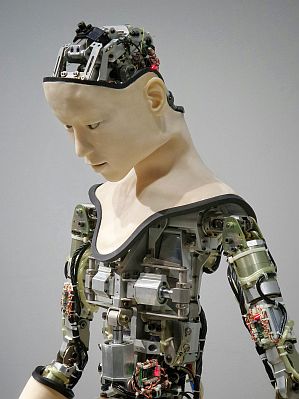Can Artificial Intelligence Reverse the Productivity Slowdown?
Ed Watal is an AI thought leader and technology investor. One of his key projects includes work on an ethical AI platform. He is the founder of Intellibus, a company whose vision is "A world where everyone is connected through AI, and everything happens instantly." In this exclusive article for MAN, Watal writes how he thinks the AI revolution will affect the current slowdown in manufacturing, and 4 ways metalworking manufacturers can implement AI to improve their operations.

Ed Watal
The AI revolution has arrived and is reshaping the business world. Across all sectors, from medicine to marketing to manufacturing, artificial intelligence is being used to power innovations that are changing the very nature of how we work.
Despite its initial impact, however, experts are still debating whether unleashing the power of AI will result in higher levels of productivity. AI is clearly capable of augmenting the efforts of today's workforce by optimizing processes and streamlining operations, but questions remain about its true value and whether it can deliver a return on investment in terms of increased productivity.
The Ongoing Productivity Slowdown
Statistics show the US is experiencing a historic decline in productivity. As 2022 began, productivity dipped to levels not seen since the 1940s. The latest reports reveal a small recovery in the third quarter of 2023, with levels inching slightly higher than their pre-Covid levels.
For the average business, a slowdown threatens profitability in a number of ways. If business costs stay the same, lower productivity means lower profit margins. Consequently, businesses have fewer resources for investments or expansions.

Lower profit margins also typically mean lower wage growth which, over the long term, can reduce worker satisfaction and retention. If wages stay low, recruiting new workers to replace those who have left also becomes challenging, creating a talent shortage.
Competitiveness is also impacted by slower productivity, as the time required to market products increases as production slows down, and lower productivity can force businesses to raise prices. Both moves give competitors an opportunity to get an edge, especially if they are able to boost their own productivity or lower costs.
Innovation can also decrease as productivity cools, since tight profit margins result in less funds to invest in development or new technologies. Lagging worker engagement triggered by lower wage growth can also hinder innovation.
For businesses in the metalworking space, overall productivity slowdowns can result in higher material costs. If prices for key materials like steel or aluminum become volatile, staying productive and profitable becomes even more challenging.
The impact on wage growth also plays out in the metalworking industry. Losing experienced workers can lead to even further declines in productivity. The time required to get younger workers up to speed on best practices further cuts into productivity.

Productivity challenges can also trigger a shift to offshoring. As this occurs, domestic firms become less capable of competing with products from abroad where labor costs are cheaper.
AI's Potential for Productivity Gains
Many see embracing artificial intelligence as the solution to the productivity slowdown. For example, AI empowers the automation of routine tasks, as well as providing tools for augmenting the impact of human workers, improving productivity by multiplying the power of the workforce.
AI can also be leveraged to improve operational efficiencies and increase productivity. By analyzing data on processes, logistics, and resource allocation, AI can suggest new strategies for streamlining operations and optimizing production capabilities. This allows businesses to make data-driven decisions with more agility, seizing opportunities and pivoting away from processes that are not producing optimally.
Predictive analysis -- another of AI's strengths -- can also be used to boost productivity. By forecasting customer needs and sales patterns, AI can empower informed decisions that bring greater efficiency to inventory and manufacturing.

The following are key ways in which AI can be harnessed to specifically improve productivity in the metalworking industry:
- Predictive maintenance: Data provided by sensors on machines can be analyzed to identify signs of impending equipment failure. This can inform more effective maintenance schedules, reducing downtime and boosting productivity.
- Production optimization: AI can analyze production workflows to identify inefficiencies, bottlenecks, and opportunities to optimize output. It can also automate scheduling to maximize the efficiency of machines and workers, making dynamic adjustments in real-time based on production data.
- Quality control: AI-powered computer vision can automatically scan components being manufactured for errors, freeing up workers for other tasks and reducing time spent on production failures.
- Inventory management: AI-driven analysis of inventory levels, supply chain operations, and customer demand can empower informed inventory management practices that lower costs and reduce waste.
Each of these practices has the potential to optimize manufacturing and minimize the impact of the factors contributing to flagging productivity.
Creating Conditions for Economic Growth
The AI revolution has brought to the business world the power to innovate on new levels, unlock data value, improve decision-making, and enhance the efforts of workers -- all of which have the potential to boost productivity and drive exponential economic growth. First, however, businesses must find the right formula for translating increased efficiency into greater productivity.
Boosting productivity will require shifts in business models to more data-driven ones. These stand to benefit the most from the power of AI, as embracing agile models that are able to adapt quickly will empower businesses to achieve the greatest benefit from the rapid evolution of AI.

Leveraging AI may also require re-envisioning the way workers are deployed. Optimizing AI will most likely require displacing some workers -- such as those in the areas of customer service, for example. It will also most likely require businesses to create new positions centered around understanding AI and deploying it in effective ways.
AI will be most capable of improving productivity when used in those types of business environments. Consequently, the challenge now falls upon business leaders to cultivate cultures that welcome AI, to adapt management methods to support its integration, and to track its benefits in a way that supports ongoing growth.
Until those types of shifts are made, investments in AI will most likely produce only minimal returns.
Want more information? Click below.
Rate this article
View our terms of use and privacy policy